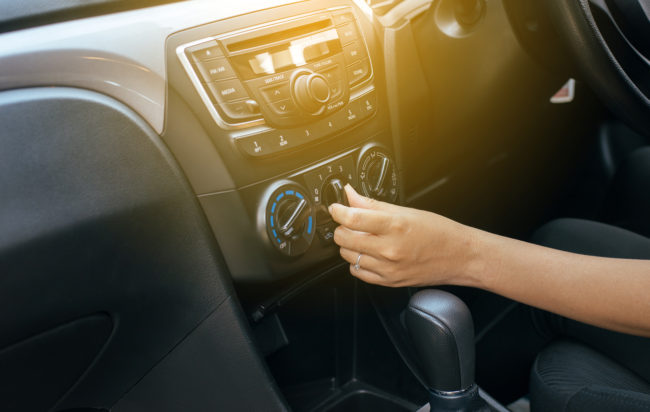
How Your Car’s HVAC System Works
The engine’s coolant system supplies the vehicle with heat. After you turn the car on, the engine works to reach its optimal operating temperature set by the thermostat. Once it reaches this point, the engine heats the coolant, which flows into the heater core and a blower forces warm air through the cabin filters. At the same time, the compressor and expansion valve pump or restrict the flow of the coolant, which affects the fluid’s temperature and pressure.
Within this operation, the heater core plays a significant role. Made of brass or aluminum tubes and multiple fans that distribute the generated heat, this part is located right below the back of the dashboard and helps defrost your car’s windows. Due to its size and functionality, the part can be particularly expensive to replace – an unfortunate reality if the core gets plugged up. When this occurs, the flow of the coolant gets backed up, and you might spot steam coming through the vents.
Other components that affect how your car warms up or stays cool include:
- The radiator, which diverts heat from the coolant to the outside. It features multiple rubber hoses that flow coolant into the heater core.
- The blower, which pushes air across the evaporator or heater core.
- An electric motor, which is operated by the climate control panel.
- The thermostat, which assists with the coolant’s flow and helps the engine reach its proper operating temperature by opening and closing circuits during warmup. When a thermostat gets stuck in the closed position, coolant cannot circulate and the car may overheat.
Heating & Cooling System Issues
Before you find fluid leaks or invest in a new heater, the following signs point to issues with the car’s HVAC system:
- In summer, the interior still feels hot with the A/C on; in winter, the car won’t warm up at all.
- There is a strange smell coming through the vents.
- You don’t feel any air blowing through the vents.
- The vehicle warms up or cools down, but not efficiently.
- The windshield or windows easily fog up.
- You see leaking antifreeze.
- The car goes through coolant faster than usual.
These issues with your vehicle’s HVAC system may go back to:
- Low coolant, possibly from a leak or normal point of maintenance, leading to overheating.
- Bacteria buildup in the evaporator, resulting in a mildew-like smell.
- A loose hose clamp, leading to a leak.
- A leaking engine cylinder head gasket, which causes fluid to leak onto the engine.
- The blowers aren’t moving hot air through the filters.
- A damaged or defective heater core, which could cause interior fogging, rapid coolant use or overheating.
- A malfunctioning thermostat affects how the engine warms up and interrupts the entire heating process.
- Debris in the coolant prevents the fluid from passing into the heater core.
Although a cold vehicle might be inconvenient in winter, not being able to defrost your windows could turn into a hazard while you’re driving. As such, any of these signs should be addressed right away.
Car Heater & A/C Repair Services
In regards to the performance of your car’s HVAC system, prevention comes down to maintenance. During these visits, a technician will assess:
- All hoses, belts and other components, looking for signs of drying, damage or cracking.
- If any components need to be repaired or replaced.
- The heater core for leaking valves or blockages.
- Coolant levels, which may need to be changed at 60,000 to 100,000 miles for newer vehicles.
Have the professionals at DaSilva’s Auto Body perform a diagnostics test on your vehicle before making any recommendations.
To learn more about our services or schedule an appointment, contact our Naugatuck shop!

